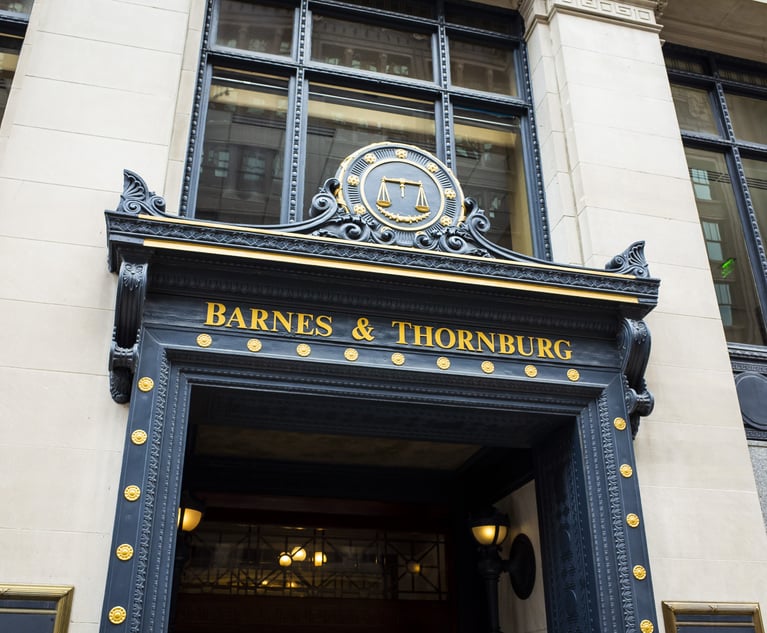Ga. Appeals Court Rules Borrower Not Personally Liable for $5M Loan on Failed Shopping Center
Judge Billy Ray, who was just confirmed to a lifetime appointment to federal court, wrote the reversal released Tuesday, joined by Judges Chris McFadden and Brian Rickman.
October 19, 2018 at 11:13 AM
4 minute read
 Judge Billy Ray (Photo: John Disney/ALM)
Judge Billy Ray (Photo: John Disney/ALM)
The Georgia Court of Appeals has reversed a grant of summary judgment to a bank holding a guarantor personally liable to repay a nearly $5 million loan for a shopping center that went under during the Great Recession.
Judge Billy Ray II, who earlier this month was confirmed to a lifetime appointment on the U.S. District Court for the Northern District of Georgia, wrote the opinion released Tuesday. Ray was joined by Judges Christopher McFadden and Brian Rickman.
The judges delivered a victory to Peter Bowers, who signed for a $4.96 million loan and put an additional $1.44 million of his and his wife's investments into a Clayton County shopping center that opened in 2006—at the height of the real estate bubble that would soon burst. Leasing did not go well. A few years later, the anchor tenant, a grocery store, closed up, and Bowers was unable to find a replacement, according to the opinion.
Meanwhile, the lender, GMAC Commercial Mortgage Bank, had assigned the loan to Wells Fargo Bank, as trustee for Holders of Credit Suisse First Boston Mortgage. Bowers went to Wells Fargo and explained that he had lost his own investment in the shopping center, was unable to continue making loan payments and wanted to hand over the property to the bank, Ray said. In 2012, Wells Fargo filed a receivership proceeding against Bowers and asked him to sign a consent agreement, which he did. The bank then sent him a notice of default, Ray said. In 2013, Wells Fargo sold the loan at auction to Today's Bank, formerly known as First State Bank of Northwest Arkansas.
“Guarantor contends that the trial court erred in holding that he became personally liable as guarantor when the shopping center became an asset in the receivership proceeding filed by Wells Fargo,” Ray said. “We agree.”
Bowers was represented by Kathie McClure of McClure & Kornheiser in Atlanta.
“This appeal presents a case of first impression in Georgia interpreting the scope of a so-called 'Bad Boy' guaranty of a nonrecourse loan secured by commercial real property,” McClure said by email Friday. “We are pleased that the Court of Appeals construed the terms of the conditional guaranty in accordance with well-established principles of contract construction.”
Today's Bank was represented by Kevin Ward, J. Zachary Zimmerman and Tyler Keenan of Schulten Ward Turner & Weiss in Atlanta.
“While I respect the Court of Appeal's decision, I think the trial court correctly interpreted the language of the loan agreement,” Zimmerman said Friday by email. “For this reason, my client is reviewing its options regarding further appeal. This is an important issue for lenders since it relates to their ability to rely on the plain language of the contracts that provide the very foundation of their businesses.”
Ray's opinion reversed Clayton County Superior Court Judge Robert Mack's grant of summary judgment to the bank.
“In a receivership proceeding filed by the lender, Borrower is not interposing other creditors potentially ahead of the lender. To the contrary, filing a receivership proceeding and getting a receiver appointed is a way for the lender to protect its security interest,” Ray said.
“It is clear that a voluntary insolvency proceeding is one commenced by Borrower and an involuntary insolvency proceeding is one commenced against Borrower,” Ray said. “It would make no sense to interpret the loan agreement to put personal liability on Borrower because it cooperated with Wells Fargo. Borrower's consent to the receivership order, at Wells Fargo's request, does not convert what would otherwise be an involuntary proceeding into a voluntary proceeding.”
Thus, Ray concluded, Bowers as borrower and guarantor “did not become personally liable when the shopping center became an asset in the receivership proceeding filed by Wells Fargo.”
The case is Bowers v. Today's Bank, No. A18A1348.
This content has been archived. It is available through our partners, LexisNexis® and Bloomberg Law.
To view this content, please continue to their sites.
Not a Lexis Subscriber?
Subscribe Now
Not a Bloomberg Law Subscriber?
Subscribe Now
NOT FOR REPRINT
© 2025 ALM Global, LLC, All Rights Reserved. Request academic re-use from www.copyright.com. All other uses, submit a request to [email protected]. For more information visit Asset & Logo Licensing.
You Might Like
View All

Justice 'Weaponization Working Group' Will Examine Officials Who Investigated Trump, US AG Bondi Says


Georgia Justices Urged to Revive Malpractice Suit Against Retired Barnes & Thornburg Atty
4 minute readTrending Stories
Who Got The Work
J. Brugh Lower of Gibbons has entered an appearance for industrial equipment supplier Devco Corporation in a pending trademark infringement lawsuit. The suit, accusing the defendant of selling knock-off Graco products, was filed Dec. 18 in New Jersey District Court by Rivkin Radler on behalf of Graco Inc. and Graco Minnesota. The case, assigned to U.S. District Judge Zahid N. Quraishi, is 3:24-cv-11294, Graco Inc. et al v. Devco Corporation.
Who Got The Work
Rebecca Maller-Stein and Kent A. Yalowitz of Arnold & Porter Kaye Scholer have entered their appearances for Hanaco Venture Capital and its executives, Lior Prosor and David Frankel, in a pending securities lawsuit. The action, filed on Dec. 24 in New York Southern District Court by Zell, Aron & Co. on behalf of Goldeneye Advisors, accuses the defendants of negligently and fraudulently managing the plaintiff's $1 million investment. The case, assigned to U.S. District Judge Vernon S. Broderick, is 1:24-cv-09918, Goldeneye Advisors, LLC v. Hanaco Venture Capital, Ltd. et al.
Who Got The Work
Attorneys from A&O Shearman has stepped in as defense counsel for Toronto-Dominion Bank and other defendants in a pending securities class action. The suit, filed Dec. 11 in New York Southern District Court by Bleichmar Fonti & Auld, accuses the defendants of concealing the bank's 'pervasive' deficiencies in regards to its compliance with the Bank Secrecy Act and the quality of its anti-money laundering controls. The case, assigned to U.S. District Judge Arun Subramanian, is 1:24-cv-09445, Gonzalez v. The Toronto-Dominion Bank et al.
Who Got The Work
Crown Castle International, a Pennsylvania company providing shared communications infrastructure, has turned to Luke D. Wolf of Gordon Rees Scully Mansukhani to fend off a pending breach-of-contract lawsuit. The court action, filed Nov. 25 in Michigan Eastern District Court by Hooper Hathaway PC on behalf of The Town Residences LLC, accuses Crown Castle of failing to transfer approximately $30,000 in utility payments from T-Mobile in breach of a roof-top lease and assignment agreement. The case, assigned to U.S. District Judge Susan K. Declercq, is 2:24-cv-13131, The Town Residences LLC v. T-Mobile US, Inc. et al.
Who Got The Work
Wilfred P. Coronato and Daniel M. Schwartz of McCarter & English have stepped in as defense counsel to Electrolux Home Products Inc. in a pending product liability lawsuit. The court action, filed Nov. 26 in New York Eastern District Court by Poulos Lopiccolo PC and Nagel Rice LLP on behalf of David Stern, alleges that the defendant's refrigerators’ drawers and shelving repeatedly break and fall apart within months after purchase. The case, assigned to U.S. District Judge Joan M. Azrack, is 2:24-cv-08204, Stern v. Electrolux Home Products, Inc.
Featured Firms
Law Offices of Gary Martin Hays & Associates, P.C.
(470) 294-1674
Law Offices of Mark E. Salomone
(857) 444-6468
Smith & Hassler
(713) 739-1250






